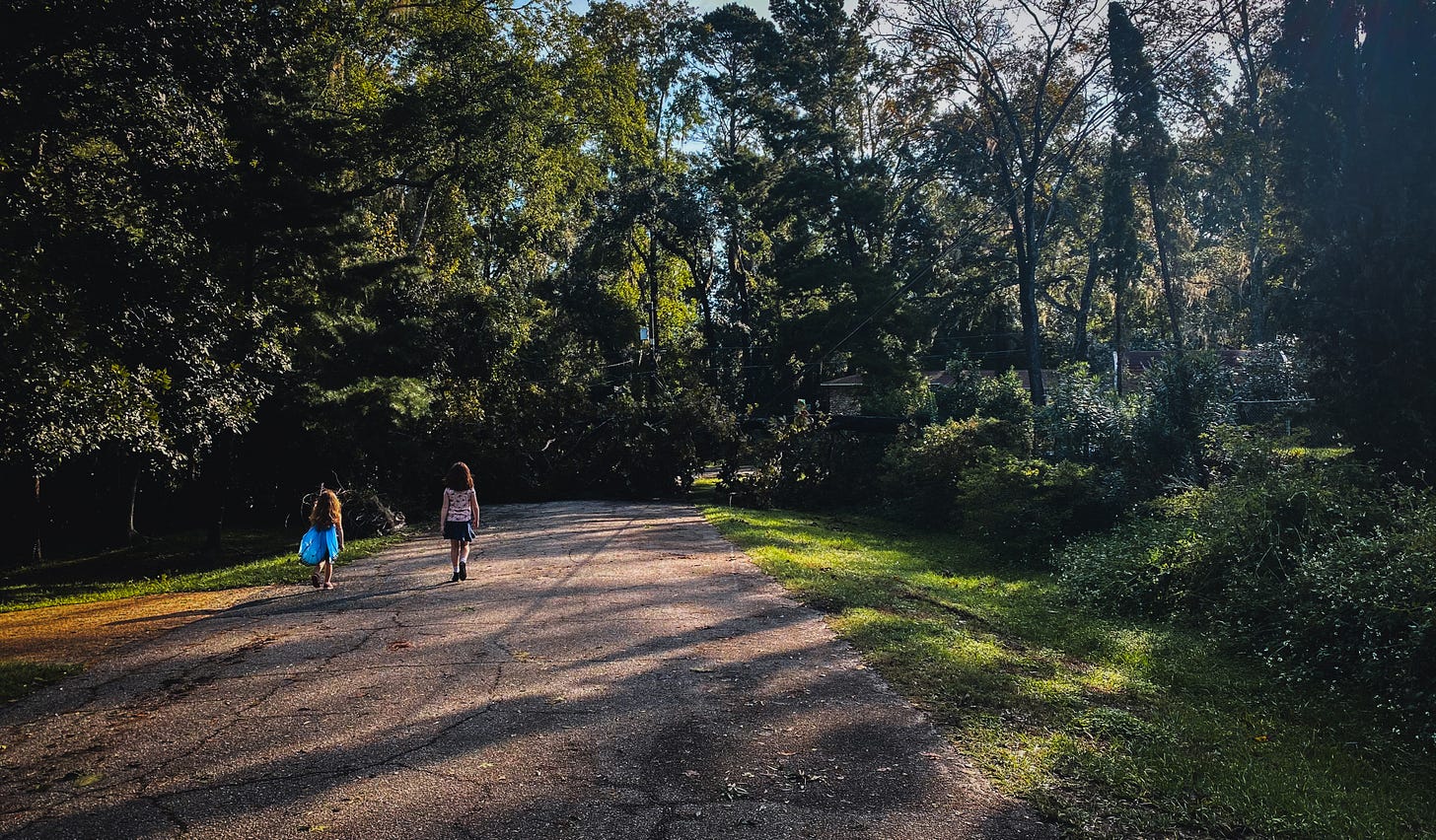#NotBlessed: It's Time to Stop Weaponizing Good Fortune by Calling It God's Favor
thoughts on theological victim blaming in Helene's aftermath

A week ago today, I awoke after a fitful and brief night of sleep (the sounds of pounding rain and roaring wind buffeting my anxious mind) to a strangely quiet house, the hum of electronics and drone of the air conditioner noticeably absent.
Outside, downed limbs littered the yard, and the top of one oak hung grotesquely, but otherwise our property was largely untouched. Around the neighborhood, several large trees lay across power lines and on houses, one second-story room cut in half by a pine.
We had been prepared for far worse. Many evacuated (it was mandatory along the coast), and the rest of us were storing water and sleeping in closets.
But at the last minute, the category 4 hurricane had zagging to the east of us, which meant we only suffered minor impact—pretty standard for hurricane season in Florida’s panhandle. We were out of power for only two days, and the cool air filling the storm’s wake almost made up for the inconvenience.
Obviously, those to the east of us and in western NC were not so lucky. I’m sure I don’t have to tell you how devastating the impact has been in that region. I don’t think we know the full extent of the damage yet even because so many are still without a means of communication. It is truly a disaster.
It’s an odd, uncomfortable feeling to see the videos and hear the tales of catastrophic damage—lives and landscapes forever changed, some landmarks and lives simply gone, vanished—and to know that, in a very real sense, that could have been us, could have been our community. Almost, in some sense, should have been.
Even before we began hearing about the devastation in NC, similar feelings arose when we realized the storm would miss us but only by instead barreling through neighboring Perry, FL, which had already suffered the impact of two other hurricanes in recent years. To celebrate when our good fortune meant someone else’s misfortune seemed insensitive, if natural and understandable.
But while I felt, and still feel, immense relief and gratitude that our area only experienced mild damage this time, I do not consider this a blessing. I do not believe that God “spared us” from the hurricane or that its turn to the east was an answer to prayer.
And I think it’s extremely important that we do not talk about it like it was.
Here’s why: To say that God spared us is to also say that God intentionally did not spare others. To say that God blessed us by turning the storm is to say that God cursed those it hit.
These statements are both profoundly unbiblical and deeply hurtful.
I don’t pretend to understand the way prayer works or how God intervenes in our world. But I do know that God doesn’t punish some people (with natural disasters or otherwise) and make life easy for others, period—much less do so because they said the right words at the right time (or satisfied some other equally arbitrary set of requirements).
A God who chooses to cause immense suffering for those who don’t check the right boxes is a cruel tyrant, akin to the gods of the ancient world who toyed with men (and women) like a cat plays with mice.
That is not a god worth worshipping. That is not the Person I know, the Person who became Love incarnate, arms open wide.
And it’s not a biblical view of God—or blessing.
I get why the Old Testament might seem like it portrays God that way. But the Great Story told in the Bible, evidenced most clearly in the radically compassionate person of Jesus, is one of unconditional, universal love, not of punishment.
And “blessed” does not equate with ease or a lack of suffering. In fact, the opposite seems to be true (see the Sermon on the Mount in Matthew 5).
This idea—that God rewarded some people for good behavior by sparing them from the storm and, therefore, punished others—is a form of victim blaming, which is antithetical to the character of the God I know.
It’s good to be grateful. It’s ok if you prayed to be spared. But don’t forget that people who lost their livelihoods and homes and children were praying too.
Does God love those whom the storm hit less? Absolutely, unequivocally NO.
To speak as if anything else is true is to betray the principles of grace, mercy, and love upon which our faith is founded.
“The rain falls upon the just and the unjust” (Matt 5:45), but “mightier than the waves of the sea is God’s love for us” (Psalm 93:44).
May we embrace this holy mystery with humility. Amen.
.
.
.
If you feel led to send financial support to Western North Carolina, here are some good options:
Mutual Aid Disaster Relief
Instagram @mutualaiddisasterrelief
Action Network: https://bit.ly/donatemadr
PayPal: mutualaiddisasterrelief@gmail.com
Venmo: @mutualaiddisasterrelief
Appalachian Medical Solidarity (put “flood support” in description)
Venmo: @AppMedSolid
CashApp: $Streets1de
Venmo: @Beloved-Asheville
CashApp: $BelovedAsheville
Operation Air-Drop
Website: https://www.operation-airdrop.com/hurricane-helene
Triangle Mutual Aid:
CashApp: $TriangleMutualAid
Upstate Food Not Bombs
Coordinating basic supplies up to the NC mountains when roads are clear.
Venmo: @UpstateFNB with comment “Alex-WNC”
Day One Relief: Collaboration-based relief and rapid response
Website:
https://dayonerelief.org/
Asheville Buncombe Community Christian Ministry helped run and provide shelter in Asheville and is partnered with the Red Cross. Donations help pay for motel and food vouchers for local residents and long-term support for those displaced.
Donations at abbcm.org/donations/ministry-fund





Your post Mara is one of the most succinct and grace-filled explanations I’ve read theologically on this. Much appreciation.
#blessed is just not good theology, no matter what team you bat for. Thank you for this thoughtful post. ❤️